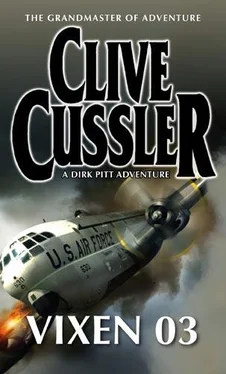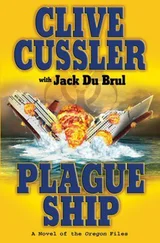It is my duty to warn your government of an impending attack on your shore by African Army of Revolution terrorists under the command of Captain Patrick Fawkes, Royal Navy retired. I deeply regret any inadvertent role my cabinet has played in this grave infamy. ERIC KOERTSMANN Prime Minister
"You have admitted guilt in the name of our Prime Minister, who is totally ignorant of Operation Wild Rose," said an astonished Zeegler. "May I ask why?"
De Vaal clasped his hands in front of him and peered at Zeegler. "I see no reason to discuss the details."
"Then may I ask why you have thrown Fawkes to the wolves?"
The Minister went back to his book with a dismissive gesture. "See to it that the message is sent. Your questions will be answered at the appropriate moment."
"We promised Fawkes to attempt his rescue," Zeegler persisted.
De Vaal sighed with impatience. "Fawkes knew he was a dead man the instant he accepted command of the raid."
"If he survives and talks to the American authorities, his confession would prove disastrous to our government."
"Rest easy, Colonel," De Vaal said with a crooked smile. "Fawkes will not live to talk."
"You seem quite certain, Minister."
"I am," De Vaal said calmly. "I am indeed."
Deep inside the bowels of the Iowa a figure dressed in greasy coveralls and a heavy wool jacket stepped from a passageway into what had been the ship's sick bay. He closed the door behind him and was enveloped in a smothering blackness. He aimed the flashlight and played its beam about the gutted room. Several of the bulkheads had been cut away and it seemed as though he was standing in an immense cavern.
Satisfied he was quite alone, he knelt on the deck and removed a small gun from inside his jacket. Then he attached a silencer to the end of the barrel and inserted a twenty-shot clip into the handgrip.
He pointed the 27.5 Hocker-Rodine automatic into the darkness and squeezed the trigger. An almost indistinguishable piff was followed by two faint thuds as the bullet ricocheted off unseen bulkheads.
Pleased with the results, he taped the gun to his right calf. After a few steps to make sure it was comfortably snug, Emma switched off the flashlight, slipped back into the passageway, and made his way toward the ship's engine room.
Carl Swedborg, skipper of the fishing trawler Molly Bender, rapped the barometer with his knuckles, regarded it stoically for a moment, then walked over to the chart table and picked up a cup of coffee. His mind visualizing the river ahead, he sipped at the coffee and gazed at the ice that was building on the deck. He hated miserable wet nights. The dampness seeped into his seventy-year-old bones and tortured his joints. He should have retired a decade past, but with his wife gone and his children scattered around the country, Swedborg could not bear to sit around an empty house. As long as he could find a berth as skipper he would stay on water until they buried him in it.
"At least visibility is a quarter of a mile," he said absently.
"I've seen worse, much worse." This from Brian Donegal, a tall, shaggy-haired Irish immigrant who stood at the helm. "Better we have rotten weather going out than coming in."
"Agreed," said Swedborg dryly. He shivered and buttoned the top button of his mackinaw. "Mind your helm and keep wide aport of the Ragged Point channel buoy."
"Don't you fret, Skipper. Me faithful Belfast nose can sniff channel markers like a bloodhound, it can."
Donegal's blarney seldom failed to raise a smile from Swedborg. The skipper's lips involuntarily curled upward and he spoke in a stern tone that was patently fake. "I prefer you use your eyes."
The Molly Bender swung around Ragged Point and continued her course downriver, passing an occasional lighted channel buoy that came and went like a streetlight beside a rain-soaked boulevard intersection. The shore lights glowed dully through the thickening sleet.
"Somebody coming up the channel," announced Donegal.
Swedborg picked up a pair of binoculars and looked beyond the bows. "The lead ship carries three white lights. That means a tug with her tow astern. Too murky to distinguish her outline. Must be a long tow, though. I make out the two white thirtytwo-point lights on the last vessel in line about three hundred yards astern the tug."
"We're on a collision course, Skipper. Her mast lights are in line with our bow."
"What is the bastard doing on our side of the river?" Swedborg wondered out loud. "Doesn't the damn fool know that two boats approaching each other should keep to their starboard side of the channel? He's hogging our lane."
"We can maneuver easier than he can," said Donegal. "Better we alert him and pass starboard to starboard."
"All right, Donegal. Swing to port and give two blasts of the whistle to signal our intentions."
There was no answering blast. The strange tug's lights, it seemed to Swedborg, were approaching far more rapidly than he had any right to expect, far more rapidly than any tug he'd ever seen with a fleet of barges in tow. He was horrified as he watched the other vessel turn toward the Molly Bender's altered course.
"Give the fool four short whistle blasts!" Swedborg shouted.
It was the Inland Waterway danger signal — sounded when the course of an opposing vessel or its intentions were not understood. Two of Swedborg's crew, roused from sleep by the whistle shrieks, groggily entered the wheelhouse, instantly snapped to sudden astonishment by the nearness of the strange vessel's running lights. Clearly, she wasn't acting like a tug in tow.
In the few remaining seconds Swedborg snatched a bullhorn and shouted into the night. "Ahoy! Turn hard aport!"
He might as well have shouted at a ghost. No voice replied; no return whistle blast came through the icy dark. The lights bore down relentlessly upon the helpless Molly Bender.
Realizing collision was inevitable, Swedborg braced himself by clutching the lower frame of the window. Fighting to the last, Donegal frantically reversed engines and twisted the wheel back to starboard.
The last thing any of them saw was a monstrous gray bow looming through the sleet high above the wheelhouse, a massive steel wedge bearing the numeral 6 1.
Then the little fishing trawler was crushed to pieces and swallowed by the icy water of the river.
Pitt stopped the car in front of the White House gate. Jarvis was halfway out when he turned and looked back at Pitt. "Thank you for your assistance," he said sincerely.
"What now?" asked Pitt.
"I have the distasteful duty of booting the President and the Joint Chiefs of Staff out of their beds," Jarvis said with a tired smile.
"What can I do to help?"
"Nothing. You've done more than your share. It's up to the Defense Department to carry the ball from here."
"The Quick Death warheads," said Pitt. "Do I have your assurance they will be destroyed when the ship is located and taken into custody? 55
"I can only try. Beyond that, I promise nothing."
"That's not good enough," said Pitt.
Jarvis was too tired to argue. He shrugged listlessly, as though he no longer gave a damn. "Sorry, but that's the way it is." Then he slammed the door. showed his pass to the guard at the gate, and was gone.
Pitt turned the car around and swung onto Vermont Avenue. A couple of miles on he spotted an all-night coffee shop and slipped into a parking stall. After ordering a cup of coffee from a yawning waitress, he found the pay phone and made two calls. Then he downed the coffee, paid, and left.
Heidi Milligan met Pitt when he entered Bethesda Naval Hospital. Her blond hair was half hidden under a scarf, and despite the weariness around her eyes, she looked vibrant and strangely youthful.
Читать дальше












